Robert Knox's Blog, page 30
May 18, 2017
The Garden and the Library: Where Flowers and Books Come Together
 Thank goodness for libraries.
Thank goodness for libraries. Where else can you go as often as you want and it's always free? Sometimes they even have people standing up in the front of the room reading things for you.
That's what I'll be doing next month at Plymouth Public Library, introducing and reading some of the poems from my first book of poetry, titled "Gardeners Do It With Their Hands Dirty."
We'll also be showing some slides taken of flowering plants grown in our perennials garden in Quincy. And offering refreshments. Maybe some the strawberries from the garden referred to in these poems will be ready by then.
The reading takes place on Monday, June 13, from 7 to 8:30 p.m. Plymouth library is located at 132 South St. The event is free. Paperback copies of chapbook will be available for purchase and signing for $15.
Here's the "third-person" press release I've been putting about to promote my new slim volume of verses. You may have seen it before.
Globe Reporter's Poems Blossom in New Poetry Book
Boston Globe writer Robert Knox, a Quincy resident, has published his first book of poetry, "Gardeners Do It With Their Hands Dirty." The book consists of 27 poems, many of them related to gardening, the outdoors, planting a perennial flower garden, and the environment. Other subjects include a father's brush with death in World War II, visits to Greece and Lebanon, a busy day on a Boston beach,family crises, a birthday party, a nostalgic glance at youthful dreams, and an encounter with Syrian refugees. The book received advance praise from Boston University poet and short story writer Robert Wexelblatt, who stated, "Knox's well-tended garden of verses furnishes readers with elegant borders, unexpected vistas, gorgeous blossoms, and insights as sharp as thorns. His themes are as local as the backyard and as universal as the weather." According to the publisher's description of the book: "The poems followed a backyard gardener's decision to dig up all the grass at his Boston area home and plant flowers, both perennials annuals, ground covers, shrubs, a small tree or two, berry bushes, and vegetables. To be an amateur means to do something not for money, but for love. A few summers later the garden blossomed, and the poems grew from the voices heard while tending the plants, pulling weeds, trimming old growth, planting anew." Knox is a freelance correspondent with a thousand bylines in the Globe South, other sections of the Boston Globe, and other newspapers. A former Plymouth resident and editor/writer for the Plymouth newspaper The Old Colony Memorial, Know recently published the novel, "Suosso's Lane," based on the Massachusetts roots of the Sacco-Vanzetti case. He presented programs on the book and the history behind it at a dozen South Shore libraries and other regional settings. As contributing editor for the online poetry journal Verse-Virtual.com, Knox has published new poetry on a monthly basis on that site. His poems and stories have also appeared in other literary periodicals. The poetry chapbook was published in May this year by Finishing Line Press, an active independent publisher of poetry based in Kentucky. "Gardeners Do It With Their Hands Dirty" is available from the publisher's website, www.finishinglinepress.com, for $14.99.
Published on May 18, 2017 13:31
May 14, 2017
The Garden of Literary Biography: "Charlotte Bronte: A Fiery Heart" by Claire Harman
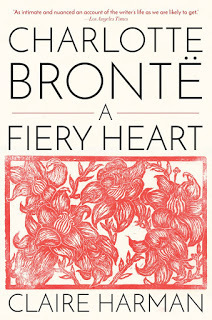 Queen Victoria, then a young woman, stayed up late reading "Jane Eyre."
Queen Victoria, then a young woman, stayed up late reading "Jane Eyre."Much of the reading public did so too. Its author was the fictional Currer Bell, since actual author Charlotte Bronte, the reclusive elder member of a household of extraordinarily inward-looking siblings, was worried that the work of any woman, much less one of relatively low social status, would not be taken seriously. A reasonable assumption. The above information comes from "Charlotte Bronte: A Fiery Heart" by Claire Harman, a recent biography timed to the bicentennial of the subject's birth. If you've read "Jane Eyre" but, like me, knew nearly nothing of the author's life, this account of her life and what the book tags 'the story of the Brontes' makes for fascinating reading -- generally sad, often bizarre, rising to a triumph rare in any lifetime, and unique in the author's own times and circumstances. If you haven't read "Jane Eyre," reading this account of the author's unlikely life will surely prompt you to do so. To put Charlotte Bronte's accomplishment in perspective, "Jane Eyre" was a 19th century literary sensation rivaled only by Dickens. To explain its originality, biographer Harman describes the book as the first realistic novel written from the point of view of a child. The character grows up in the course of the book, but her early life, with its losses and traumas is told in the voice of the defenseless, but courageous child who experiences them. Dickens broke ground in bringing to serious writing the concerns of the lower classes, common people, life's "unfortunates," orphans. "Nicholas Nickleby," a devastating muckraker, exposes the cruel treatment afforded poor orphan boys. Bronte upped the ante -- ground-breaking, new, implicitly shocking -- by exploring circumstances, hardships, and the gamut of human emotions from the perspective of an abused, neglected, but smart and determined girl. Readers, including the era's literary lions such as William Thackery (author of "Vanity Fair") were transfixed. To add further degrees of phenomenal to this sensation in the history of publication, the book was a first book by a writer no one had ever heard of. And, of course, the publishers had no idea that "Currer Bell" was a pseudonym. Only when some other nefarious publisher tried to pirate 'Currer Bell's' work, did Charlotte Bronte come forward, traveling unannounced to London with her sister Anne for courage, to announce her existence in the public room of her publisher's offices and demand that they take actions against infringement of their rights. The publisher stares at the strikingly, small, quaintly dressed woman. Literary surprise of the century! "You are Currer Bell?"
This moment was recently captured in an otherwise disappointing recent Masterpiece Theater film, "To Walk Invisible: The Bronte Sisters,” a striking example of missed opportunity. For, as Claire Harman's book demonstrates, the unique (a word that actually applies in this instance) story of Charlotte, Emily and Anne Bronte is still an incredible tale. The Bronte family was poor, isolated, fantastically literate. Their father was an Irish-born Church of England vicar, with a parish in barely civilized Yorkshire (the word 'rude' comes to mind), lacking English relatives or local connections. He was mostly interested in tutoring his only surviving son in Latin and Greek. His wife died after a delivering a seventh child. He sent two daughters, including the elder who at age 10 had assumed the 'mother' role for the younger children to a cheap school with brutal conditions, where they proceeded to die. His son Bramwell and the three surviving daughters then created a fantasy world of characters sometimes modeled on real figures -- military and political figures they read about in their father's newspapers -- whose explorations and exploits they wrote about in tiny books made of tinier writing (legible only under magnification). A shared world, that is, into which it would be inaccurate to say the children 'withdrew' since there was virtually nothing to withdraw from. To get the rest of the family details, both stirring and sad, read this well written and researched book -- a biography plus one or more. Suffice it to say that in addition to Charlotte's novels, the family produced a major English poet in Emily Bronte. England in the 19th century did not have a category for female poets (outside, perhaps, a famous poet's wife); recognition for Emily Bronte's poems came in the 20th century. Emily also wrote one of the canonical English novels, "Wuthering Heights," a work that still strikes many of us as alternately brilliant and amateurish. And a book that gave us archetypes of a passionate connection too strong for life, or death. Charlotte's "Jane Eyre" was a sensation, a cultural gut-check, a new and deeper exploration of society and the individual. In a time before movies, it spawned theatrical exploitations of its popularity. Emily's "Wuthering Heights" too was a sensation, but also a scandal. Too much candor for the English public to accept from a woman. Outside of the shadow of her talented sisters, Anne Bronte's fiction and poetry makes the sort of interesting early 19th century 'women's writing' that PhD candidates study. What happens to their sad brother and the three Bronte sisters rewards any reader's attention, though it won't make us happy. I need add only one significant fact about their father. Reader, he outlived them all.
Published on May 14, 2017 12:01
May 7, 2017
The Garden of the Seasons: Maypole Dance of the Tulips
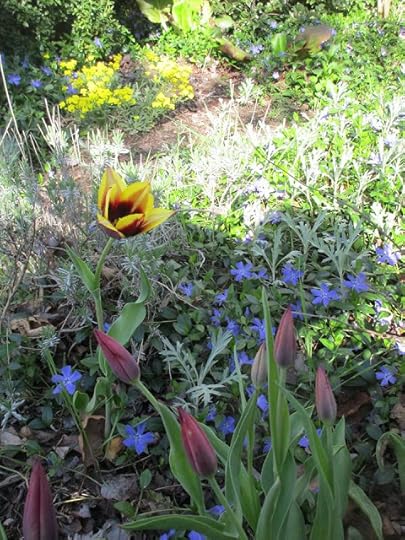 Tulip time in Eastern Massachusetts is the last week of April and early May. In the top photo here, see also the low ground covering Vinca Minor well along in its blooming season.
Tulip time in Eastern Massachusetts is the last week of April and early May. In the top photo here, see also the low ground covering Vinca Minor well along in its blooming season. In the background the low, yellow- flowering plant is a Saxatile Alyssum (aka Basket of Gold), getting a little better every year.
Second photo down, a pale daffodil with a complicated blossom structure. Also pictured the green thumb of daughter Sonya, who took these photos.
In the last two photos below, a few feet away from the spot pictured in the top photo, a row of dark pink tulips, who have found a place they like.
The third photo down: a yellow tulip with red arrows comes in close for her close-up.
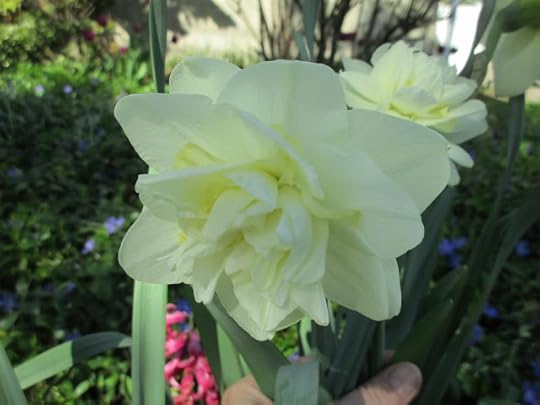
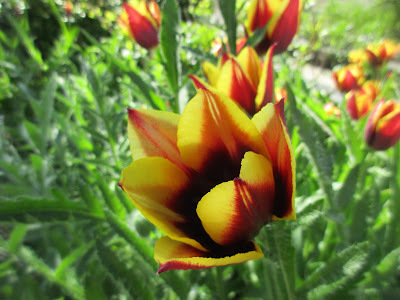
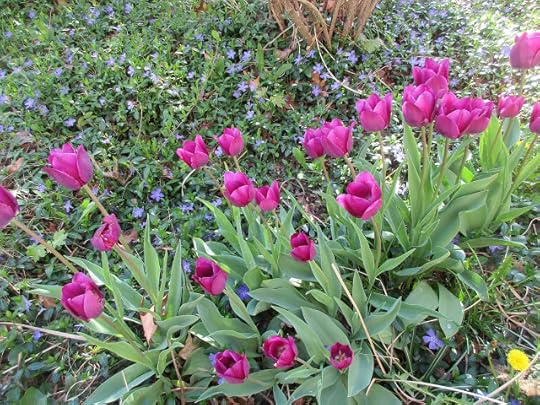
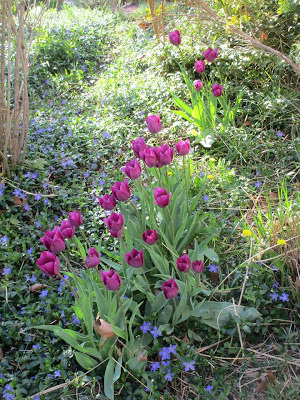
Published on May 07, 2017 09:13
May 4, 2017
The Garden of Verse: A Birthday Celebration With a Brand New Book
 My copies arriving by UPS serendipitously on Wednesday, my birthday, my chapbook "Gardeners Do It With Their Hands Dirty" has been released. My thanks to editor Christen Kincaid and Finishing Line Press: The book looks great.
My copies arriving by UPS serendipitously on Wednesday, my birthday, my chapbook "Gardeners Do It With Their Hands Dirty" has been released. My thanks to editor Christen Kincaid and Finishing Line Press: The book looks great. My first poetry book, it's filled with poems that were originally published on Verse-Virtual.com. So thanks even more to V-V editor Firestone Feinberg and fellow V-V poet Robert Wexelblatt for their recommendations. Some of the poems here were first published in other journals.
For anyone interested in obtaining a copy, the books are available at https://www.finishinglinepress.com/pr... The price is $15.
Here's the 'full description' of the book's contents written for the use of the publisher in its publicity releases. The description is written in the third person in my usual modesty:
The poems in "Gardeners Do It With Their Hands Dirty" discover a universe in a perennial flower garden. A reporter and a novelist, Robert Knox's poems are as immediate as today and as universal as the weather. The characters in these poems are May and September, roses, asters, morning glory, anemone, honey bees, squirrels and hummingbirds. These poems followed a garden lover's decision to dig up all the grass at his Boston area home and plant flowers, both perennials annuals, ground covers, shrubs, a small tree or two, berry bushes, and vegetables. To be an amateur means to do something not for money, but for love. A few summers later the garden blossomed, and the poems grew from the voices heard while tending the plants, pulling weeds, trimming old growth, planting anew.
While Knox is an amateur gardener, he's a professional writer, with a thousand bylines in the Boston Globe and other new newspapers and periodicals, writing news, features, op-eds, book reviews, and arts and entertainment columns. His fiction and creative nonfiction stories have appeared in various literary periodicals. He is a contributing editor for the online poetry journal Verse-Virtual, and his novel on the Massachusetts roots of the Sacco-Vanzetti case, "Suosso's Lane, has won praise from readers and reviewers.
When the gardener goes indoors, he remembers history: a father's wartime brush with death, family crises, his own slow dance with youthful dreams. In poems dealing with the greater world, preschoolers dash across busy roads, adult children have childlike birthdays, and Syrian refugees beg on the streets of Beirut. The poems in "Gardeners Do It With Their Hands Dirty" also visit idyllic Greek islands, take a journey along the Sacred Way to ancient Delphi, discover an old wooden wall that survived a decade and a half of ruinous civil war and the furious reconstruction of Lebanon's capital city, and reflect on winter nights filled with silent buses and Chinese spices... while the stars go on telling stories of their own. As his lines saluting an urban balcony garden (from "The Leaf Washers") proclaim, we celebrate our own lives when we cherish the leaves in our garden: "They mediate the base of things, the fundamentals,/ Molecules, waves, atoms, energy-matter – the rain in Piccadilly,/ The fountains of Beirut, the voices of the stars."
Published on May 04, 2017 21:32
May 3, 2017
The Garden of Verse: Celebrating the Freedom to Create in This Month's Verse-Virtual

The new month's issue (May 2017) of Verse-Virtual proclaims the freedom of the imagination. An umbrella becomes the Eiffel Tower, a map flies out of a car like an origami bird, angels make emergency calls, a memory turns a man into a shadow.
In Sylvia Cavanaugh's dancing-in-the-rain recreation of childhood's imagination, "There Was This Original Me," that early version of "me" discovers the charms of the umbrella:
A thin silver stem
rose from the hooked handle
to unfold into a complicated
metal frame, delicate
and elegant as an Eiffel Tower
I could hold in one hand.
In Catherine Wolf's "Ode to All Birds," the poet performs an emergency wildlife rescue in cruel weather --"You know black capped chickadees are hours away from death in icy blizzards" -- dashing outdoors to fill a bird feeder, and her poem turns the birds "into refugees at sea." The poem then catalogues eight different birds swarming the feeding station (I wish I could be that certain of what I'm seeing at our feeder), and ultimately extends the comparison, pointing out the diversity of winged creatures "all eating from the same table."
In Donna Hilbert's poem "Angels," we learn that angels are people too. They lounge about until needed, "watching the world like mid-season TV," but leap into action when emergency calls:
Occasionally one is requested
to stop a train in its tracks,
pull a child from a river,
or lie down with a hiker
lost days in the snow—
the angel equivalent
of a triple A call.
It’s the rare angel who’s asked
to stop a war.
Rescue accomplished, the hero then returns to the clubhouse "insufferable with accomplishment" to proclaim "over bingo,
'You should have been there, seen/ the way I put my shoulder to the train.'"
All I can add is we so want that rare angel on our side.
Joan Colby deploys her imagination with painful accuracy in "Podiatry." After the doctor removes a disablingly damaged toenail, we are asked to picture this brilliant, if painful, image:
Your toe, page of erasure,
A fat white grub. Underneath
It’s all gore like the untold stories
Of the podiatrist’s mother and father.
It turns out the podiatrist's tale is tougher than the poet's description of her surgery. His parents, the poem tells us, were
Holocaust survivors. The day they walked
Out of the abandoned barracks.
Living skeletons, their feet
Wrapped in rags, what a day that was!
The imagination of size impresses us in Michael Minassian's poem "A Family of Giants." The poet is treated by an older relative to"an Armenian/ folktale about a family/ of giants who lived in caves..." The point of this story? Jack, the older relative, answers with a question:
What do we call the world?”
he asks, “When the giants
no longer reveal themselves?”
"Diminished," we think, providing an answer of our own. The comparison is implicit when the Armenian immigrant Jack speaks of shaving his mustache and trimming his eyebrows to fit in to America, but is unable to hide his accent. But perhaps the 'giants' do reveal themselves, in time, when Jack and the poet head for home. Read the poem's last lines containing the words "long shadows" and decide for yourself.
Final credit for the subject of Ryan Warren's poem "By the Wind Sailors" belongs to nature. But the poet gets a strong assist here. The poem's strong rhythms, short lines and exotically Latinate scientific terms produce an incantation. Or a praise song.
We have named you
Velella velella.
We have named you
By-the-wind-sailor.
We have named you
Cnidaria,
Hydrozoan,
Anthomedusae,
Porpitidae,
Velella. We have named
your blue jellied bodies
your sea-worthy sails,
rigged on ridged backs.There's a lot more to this poem worthy of reflection, including its depiction of how plants communicate (a subject, personally, I can't get enough of). The act of imagination lives in the science, the natural fact, the thing in itself and transcends it as well.
The poem entire, and lots more magic, can be found in this month's Verse-Virtual: http://www.verse-virtual.com/poems-an...
Published on May 03, 2017 14:12
May 1, 2017
The Garden of Song: The Genesis Chamber Singers Offers New Music For Old Words
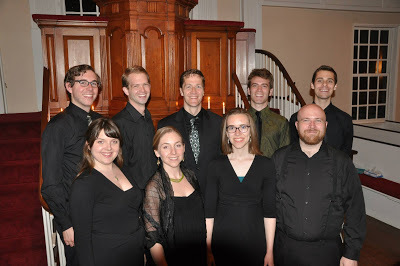 The delightful concert by the Genesis Chamber Singers we heard Saturday night at The James Library & Center for the Arts in Norwell, titled "William The Bard" offered modern musical settings of texts by Shakespeare, including the world premiere of a work by composer Adria Stolk. Adria Stolk happened to be sitting behind us to hear her new piece, commissioned by -- no coincidence -- The Genesis Chamber Singers, and engaged in a brief Q&A with the audience shortly after the last note. The interaction appears typical of the group's fresh approach -- new music, young singers, and a willingness to engage. The new ensemble of singers and director possessing beautiful voices and superb musicality was created to bring high quality chamber music specifically to South Shore venues like The James. Their next performance takes place in Cohasset. They've also performed in Hingham and Quincy and other local communities. According to the group's mission's statement, the "vibrant and engaging performances of a wide variety of choral chamber music [seeks]to enrich the lives of south Shore communities and makes connections with new audiences." Judging from what we heard, the mission is well served.by director Joseph Young and the ensemble's highly trained singers. Saturday's concert was titled "William the Bard" and included musical settings of texts from Shakespeare's plays and sonnets by 20th century master Ralph Vaughan Williams and a flowering of 20th century composers from diverse backgrounds. The music is modern in the best sense -- fresh, original, daring, strong, and also clever, charming, and challenging. The group performed Vaughan Williams' setting of "Full Fathom Five," one of the most familiar and often set-to-music of Shakespeare's songs from plays (this one from The Tempest). The lyrics begin: "Full Fathom five thy father lies./ Of his bones are corals made./ Those are pearls that were his eyes." Two other pieces by the 20th century English titan followed. Stolk's piece, titled "Doubt," sets perhaps the most original choice for a text, four lines from "Hamlet": "Doubt thou the stars are fire/ Doubt that the sun doth move/ Doubt that truth be a liar,/ But never doubt I love." The composer said that she tried to make the music reflective of the word "doubt," because the words is so prominent in the four lines and also because the concept is central to Hamlet's tragedy. She did that by setting the middle two lines well outside of harmony, and then returning to a minor key for the final powerful line. The piece is short but moving, and the beauty of the last line the greater for the musical distance traveled to get there. For me, part of the work's power comes from remembering the Prince of Denmark's tragic renunciation of the very pledge he made in that final line. The four-line text is taken from a letter the prince wrote to Ophelia before his father's murder. After the murder he chillingly tells her "I never loved thee" -- punishing the daughter for the sins of the fathers. And making a liar of himself. Other works performed include fours songs by Finnish composer Jaakko Mantyjavi in the 80s (including another setting of "Full Fathom Five") and a rousingly dark and lively rendition of the witches' dialogue in Macbeth, titled "Double, Double Toil and Trouble." "Three Madrigals: by Emma Lou Diemer" strikes me as a classic evocation of the Elizabeth sensibility, since people did sing madrigals in Renaissance times. The first of these "O Mistress mine, where are you roaming?" is one of the most familiar songs taken from the plays, often set, recorded and performed. The song was written for "Twelfth Night," one of the richest of Shakespeare's comedies and (I believe) the play with the most songs. The concert also featured several versions of Shakespeare's sonnets, including two settings of "Shall I Compare Thee to a Summer's Day?" by Swedish composer Nils Lindbergt and George Shearing, respectively. Shearing is famous for his song "Lullably of Birdland" and his collaborations with 'song stylist' Mel Torme. All his s settings here sounded like elegant-school jazz to me, an effective contrast to some of the denser textures of the other pieces. The concert also included works by Romanian born Gyorgy Orban and Ward Swingle, who founded the Swingle Singers in the early 60s and of whom Young writes in the program "Swingle essentially invented the modern contemporary a cappella style 'where the whole point twas that we use our voice instrumentally.'"
The delightful concert by the Genesis Chamber Singers we heard Saturday night at The James Library & Center for the Arts in Norwell, titled "William The Bard" offered modern musical settings of texts by Shakespeare, including the world premiere of a work by composer Adria Stolk. Adria Stolk happened to be sitting behind us to hear her new piece, commissioned by -- no coincidence -- The Genesis Chamber Singers, and engaged in a brief Q&A with the audience shortly after the last note. The interaction appears typical of the group's fresh approach -- new music, young singers, and a willingness to engage. The new ensemble of singers and director possessing beautiful voices and superb musicality was created to bring high quality chamber music specifically to South Shore venues like The James. Their next performance takes place in Cohasset. They've also performed in Hingham and Quincy and other local communities. According to the group's mission's statement, the "vibrant and engaging performances of a wide variety of choral chamber music [seeks]to enrich the lives of south Shore communities and makes connections with new audiences." Judging from what we heard, the mission is well served.by director Joseph Young and the ensemble's highly trained singers. Saturday's concert was titled "William the Bard" and included musical settings of texts from Shakespeare's plays and sonnets by 20th century master Ralph Vaughan Williams and a flowering of 20th century composers from diverse backgrounds. The music is modern in the best sense -- fresh, original, daring, strong, and also clever, charming, and challenging. The group performed Vaughan Williams' setting of "Full Fathom Five," one of the most familiar and often set-to-music of Shakespeare's songs from plays (this one from The Tempest). The lyrics begin: "Full Fathom five thy father lies./ Of his bones are corals made./ Those are pearls that were his eyes." Two other pieces by the 20th century English titan followed. Stolk's piece, titled "Doubt," sets perhaps the most original choice for a text, four lines from "Hamlet": "Doubt thou the stars are fire/ Doubt that the sun doth move/ Doubt that truth be a liar,/ But never doubt I love." The composer said that she tried to make the music reflective of the word "doubt," because the words is so prominent in the four lines and also because the concept is central to Hamlet's tragedy. She did that by setting the middle two lines well outside of harmony, and then returning to a minor key for the final powerful line. The piece is short but moving, and the beauty of the last line the greater for the musical distance traveled to get there. For me, part of the work's power comes from remembering the Prince of Denmark's tragic renunciation of the very pledge he made in that final line. The four-line text is taken from a letter the prince wrote to Ophelia before his father's murder. After the murder he chillingly tells her "I never loved thee" -- punishing the daughter for the sins of the fathers. And making a liar of himself. Other works performed include fours songs by Finnish composer Jaakko Mantyjavi in the 80s (including another setting of "Full Fathom Five") and a rousingly dark and lively rendition of the witches' dialogue in Macbeth, titled "Double, Double Toil and Trouble." "Three Madrigals: by Emma Lou Diemer" strikes me as a classic evocation of the Elizabeth sensibility, since people did sing madrigals in Renaissance times. The first of these "O Mistress mine, where are you roaming?" is one of the most familiar songs taken from the plays, often set, recorded and performed. The song was written for "Twelfth Night," one of the richest of Shakespeare's comedies and (I believe) the play with the most songs. The concert also featured several versions of Shakespeare's sonnets, including two settings of "Shall I Compare Thee to a Summer's Day?" by Swedish composer Nils Lindbergt and George Shearing, respectively. Shearing is famous for his song "Lullably of Birdland" and his collaborations with 'song stylist' Mel Torme. All his s settings here sounded like elegant-school jazz to me, an effective contrast to some of the denser textures of the other pieces. The concert also included works by Romanian born Gyorgy Orban and Ward Swingle, who founded the Swingle Singers in the early 60s and of whom Young writes in the program "Swingle essentially invented the modern contemporary a cappella style 'where the whole point twas that we use our voice instrumentally.'" And that in a nutshell is what The Genesis Cantata Singers did so well in this program. The group's gala fund-raiser, "Gift of Music" offering wine and hors d'oeuvres along with your music, takes place Saturday, June 10, 7 p.m., at First Parish Church in Cohasset.
Published on May 01, 2017 10:00
April 25, 2017
April Poetry: When Monkish Scribes Doodled in the Margins
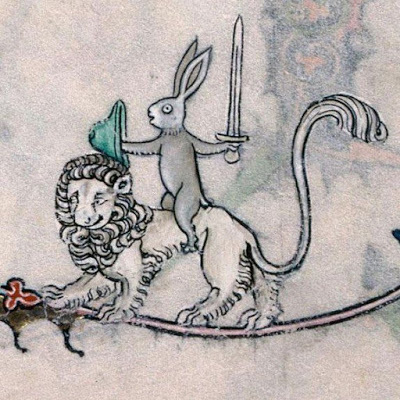
Here's the prompt for April 24 from napowrimo.net, the website that encourages poets to write a new poem each day during National Poetry Month:
Today, I challenge you to write a poem of ekphrasis — that is, a poem inspired by a work of art. But I’d also like to challenge you to base your poem on a very particular kind of art – the marginalia of medieval manuscripts. Hereyou’ll find some characteristic images of rabbits hunting wolves, people sitting on nests of eggs, dogs studiously reading books, and birds wearing snail shells. What can I say? It must have gotten quite boring copying out manuscripts all day, so the monks made their own fun. Hopefully, the detritus of their daydreams will inspire you as well!
Here's my poem based on an image captured from medieval manuscript marginalia:
Ears at Ready
What's with the rabbits?All right, they're the hamburger of the natural world.What did you get, Momma Fox asks Daddawhen he's back from the hunt -- Rabbit again?This rabbit is in a fighting mood. We know exactly who he is because his ears are strikingly long, and straight up. Talk about obvious.He is holding a sword, also long and vertical, paralleling the earsListen to me, such posture declares, or my shiny claw will speak daggers!But from the expression on his minimal features, he's not as braveas his posture suggests.We see him profile, one eye lifted, a soft nose in a rounded profile.He would be fierce, and armed, his pose proclaims,But it's really not himand his mouth is open in way the suggests "Yikes!"rather than "Take that, dastardly predator!"His courage is borrowed by the convenience,our marginalizing monk shows us, of riding on the back of rather humorously featured heraldic lionwith those tightly repeated framing curls as if set by a perm;his lionish bulk transformed into a rabbit-carrying pony,but still sufficient to cover the head, neck and shoulders of a slender four-legged pretty-brown creaturewith his big, buff, shaggy paw.Lion's features are rather childishly amused,perhaps by the prospect of serving as a warhorse for a rabbit -- or, perhaps, as surrogate for a poor, put-upon scribbling monk?And under that powerful paw, as if felled by a falling tree, who's that ? Could it be Mr. Foxy?The thing is, though, when we reckon this little guy,
his full skimpy length on a near par with those strictly elevated bunny ears, we can't help thinking, "Jeez, Mr. Rabbit, couldn't you have taken him without bringing along a lion?"
Published on April 25, 2017 07:59
April 23, 2017
The Garden of the Seasons: April Love
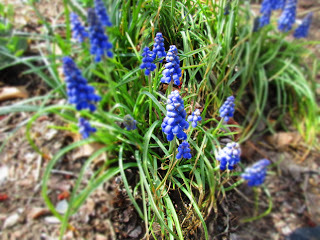
What to do in April?
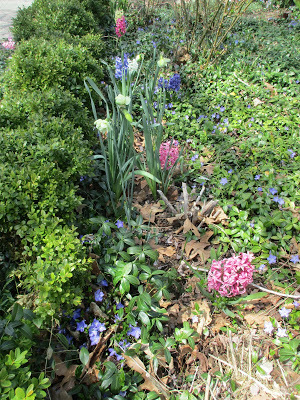 Get the ice out of the earth, the mud out of the dirt, the sub-freezing numbers out of the 'early warning' forecast -- as the local cable news refers to its special tease apparently offered to prepare you for the shock each day's weather. (Do we truly need to be warned every day that we live in a changeable climate?) What to do when the longing for spring begins to be answered? Get the garden tools out of the basement, and put the snow shovels in their place, since these two toolish families share a seasonal berth.
Get the ice out of the earth, the mud out of the dirt, the sub-freezing numbers out of the 'early warning' forecast -- as the local cable news refers to its special tease apparently offered to prepare you for the shock each day's weather. (Do we truly need to be warned every day that we live in a changeable climate?) What to do when the longing for spring begins to be answered? Get the garden tools out of the basement, and put the snow shovels in their place, since these two toolish families share a seasonal berth.
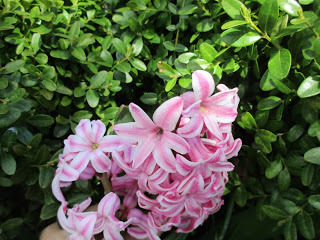 Remember where you put the garden gloves, the thick brown-paper leaf bags, the list of uncompleted preparation-for-winter chores. (No, forget about that.) Remember the names, and locations, of the plants you are expecting back this year for their long-awaited annual visit. (Such as the Japanese primrose, fourth photo down; and Spring Vetch, bottom pic.) This will take some time. Remember what it feels like to bend. This way. Or that.
Remember where you put the garden gloves, the thick brown-paper leaf bags, the list of uncompleted preparation-for-winter chores. (No, forget about that.) Remember the names, and locations, of the plants you are expecting back this year for their long-awaited annual visit. (Such as the Japanese primrose, fourth photo down; and Spring Vetch, bottom pic.) This will take some time. Remember what it feels like to bend. This way. Or that.
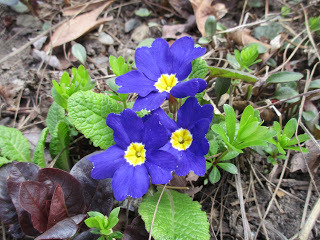 Study up on the bird calls. Can a bluejay do that? Is it mockingbird time already?
Study up on the bird calls. Can a bluejay do that? Is it mockingbird time already?
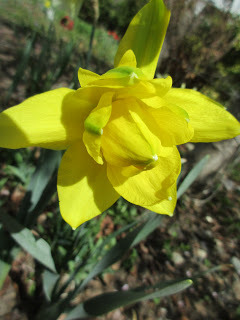 Reacquaint yourself with sudden alterations of character in the seasonal face. Easter Sunday was warm, even too warm. Patriots Day was perfectly springlike. A good day for walking in the woods and discovering that signs of spring are rarer there than in your own backyard. No leaves on the trees. Few green shoots from the ground. Skunk cabbage is still the dominant 'seasonal' arrvial. Nobody rakes up the leaves in the woods.
Reacquaint yourself with sudden alterations of character in the seasonal face. Easter Sunday was warm, even too warm. Patriots Day was perfectly springlike. A good day for walking in the woods and discovering that signs of spring are rarer there than in your own backyard. No leaves on the trees. Few green shoots from the ground. Skunk cabbage is still the dominant 'seasonal' arrvial. Nobody rakes up the leaves in the woods.
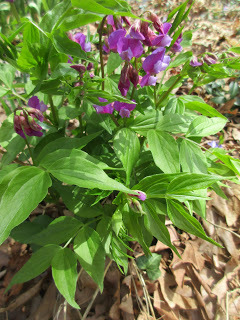 Saturday (April 22) on the other hand was raw and rainy at midday. The falling rain was making clicking sounds on the windows. Then Sunday dawns cloudless-bright, and stays sunny and cool all day. What else to do in April? Put away the winter boots. The ones you wear in the snow when shoveling the driveway. They ones you wear when you're contemplating a 'winter hike' and know that your feet will be really, really cold if you don't wear them. Take a walk in a familiar neighborhood you haven't visited since the sun's northern-trending equinoctial passage in order to enjoy the differences. Other people's rhododendrons are doing well; what happened to ours? Confirm, by the evidence of other landscapes, that this is truly hyacinth (second and third photos down) season. Daffodil time too (fifth photo down). And bunches of grape hyacinth (top photo), deep blue and abundant, are staking out corners and lot-lines like an early harvest from the return of the sun. Notice how late the hour is while the sun's still high. Notice new deep brown additions to those landscapes you pass by, where mulch, soil, or soil amendments are making an early appearance ... Consider this option for several of your own spaces, while you can still get at them, before welcome, and unwelcome, guests spread tent-wings over your ground. Consider that next week will already be too late to 'get ahead' of the weeds. I checked this afternoon. The weeds are already leading.
Saturday (April 22) on the other hand was raw and rainy at midday. The falling rain was making clicking sounds on the windows. Then Sunday dawns cloudless-bright, and stays sunny and cool all day. What else to do in April? Put away the winter boots. The ones you wear in the snow when shoveling the driveway. They ones you wear when you're contemplating a 'winter hike' and know that your feet will be really, really cold if you don't wear them. Take a walk in a familiar neighborhood you haven't visited since the sun's northern-trending equinoctial passage in order to enjoy the differences. Other people's rhododendrons are doing well; what happened to ours? Confirm, by the evidence of other landscapes, that this is truly hyacinth (second and third photos down) season. Daffodil time too (fifth photo down). And bunches of grape hyacinth (top photo), deep blue and abundant, are staking out corners and lot-lines like an early harvest from the return of the sun. Notice how late the hour is while the sun's still high. Notice new deep brown additions to those landscapes you pass by, where mulch, soil, or soil amendments are making an early appearance ... Consider this option for several of your own spaces, while you can still get at them, before welcome, and unwelcome, guests spread tent-wings over your ground. Consider that next week will already be too late to 'get ahead' of the weeds. I checked this afternoon. The weeds are already leading.
Published on April 23, 2017 20:50
April 22, 2017
National Poetry Month: It's How You Play the Game
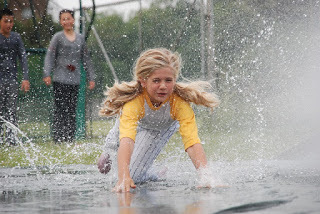
The prompt from National Poetry Writing Month, the website that encourages poets to write a new poem every day throughout the month of April, calls for writing a poem based on the jargon of a sport of game. Here's how the site put it:
Today, I challenge you to write a poem that incorporates the vocabulary and imagery of a specific sport or game. Your poem could invoke chess or baseball, hopscotch or canasta, Monopoly or jai alai. The choice is yours!
[http://www.napowrimo.net/]
Here's my poem.
The Odd Ball Game
I take a swing at Stumpy's curve And leg a hit to short and dirt And wish that I would have the nerve to grow my hair or wear a skirt
Bello follows, swinging big but bleeds a squib An easy out at second base He hollers to the world he's safe And snarls at me and tells a fib
He's stylin' when they pick him off But bitches at Ump Stinky's call I'm hoping he will get the toss But he is big and Stinker's small
The game drags on all afternoon They kick our butt, you'd never know From Bello's rants and taunts and lies You'd think he was the only show
I'm rapping with our Number Nine Her eyes are big, her hair is fine She plays the game as I think I could But I am wary, and she is good
Then Bello roars, and flaunts, and steals a pinch Nine swings a bat at his fat rump He stumbles and disputes the play "You can't do that, my name is Dump"
But rules are rules, and girls can play It's not as hard as they make it seem And the score that counts is the game of life Next year I'll start another team
Published on April 22, 2017 09:10
April 21, 2017
The Garden of Delayed Expectations: 'Gardeners Do It" Reading Rained Out By Publication Delay
 I've postponed my scheduled poetry reading and book signing at Plymouth Library, planned for Monday, April 24, because the books haven't arrived from the publisher. My first book of poems, a chapbook entitled "Gardeners Do It With Their Hands Dirty" is being published by Finishing Line Press, but the press has fallen significantly
I've postponed my scheduled poetry reading and book signing at Plymouth Library, planned for Monday, April 24, because the books haven't arrived from the publisher. My first book of poems, a chapbook entitled "Gardeners Do It With Their Hands Dirty" is being published by Finishing Line Press, but the press has fallen significantly behind schedule.
Plymouth Public Library has kindly agreed to reschedule the reading and book signing after the books arrive from the publisher.
Published on April 21, 2017 07:41



